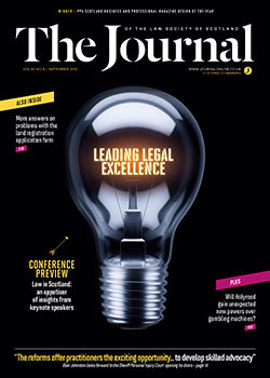Place your bets

The licensing of betting premises continues to be one of licensing law’s leading areas of controversy. Proposals in the Scotland Bill may make significant changes to this area, with major implications for licensing boards, the trade and communities.
The existing position is that licensing boards control the issue of betting premises’ licences. They do so by complying with s 153 of the Gambling Act 2005, which requires as a general principle that licensing boards “aim to permit” the application, having regard to the gambling licensing objectives and various guidance and policies. Local authority and pressure group opposition to gambling machines is, however, at fever pitch, with many arguing that the Act is of little use to those who wish to prevent bookies or the machines they allow. One Scottish licensing board member tweeted recently: “The Gambling Act is toothless, unfit for purpose & urgently in need of amending!”
Campaign issues
Some English councils have sought to stop betting premises not by licensing but through planning laws. Often the two are confused and conflated in the media. When betting shops fall under Use Class 2 – financial services, no application for change of use is needed where a betting shop is to open in Class 2 or Class 1 use premises. Calls to remove betting shops from Class 2 and make them sui generis (as arcades and pubs are) were consulted on by the Scottish Government. In England & Wales betting became sui generis as of April 2015. However, Scottish ministers concluded that there should be no change to planning laws north of the border.
There are concerns across the UK about the perceived proliferation of betting shops, but specifically about the number of fixed odds betting terminals (FOBTs) available. Some claim these machines are particularly addictive; the media often label them the “crack cocaine” of gambling. The Gambling Act creates various categories of machine, from high-end casino machines all the way to your seaside “crane grabber”. FOBTs are category B2 machines, allowed only in betting shops and casinos.
I think it is fair to say that there is much hysteria surrounding FOBT or B2 machines. Pressure groups such as the Campaign for Fairer Gambling and Stop the FOBTs provide regular soundbites in local press reacting to councils or councillors raising issues over these machines. They have also featured in two BBC documentaries, including a Panorama exposé in 2014, and a mini-series, Britain at the Bookies, aired in July and August 2015.
There have been two recent attempts down south to deal with the perceived problem of FOBTs by reducing the maximum stake, currently £100, to £2. The first was led by Newham Council, voracious opponents of FOBTs, which led a number of local authorities in appealing for legislative change under the Sustainable Communities Act 2007 on the basis of “promoting the sustainability of local communities”.
The UK Government rejected this proposal in July, as it had already introduced stronger controls “to further protect players and promote responsible gambling”. This reflects a number of voluntary measures introduced by the betting industry in 2014 and 2015 and the establishment of a national responsible gambling industry-led watchdog called the Senet Group.
At the same time, Lord Clement-Jones introduced a Private Member’s bill, the Gambling (Categorisation and Use of B2 Gaming Machines) Bill, in the House of Lords. In a vote on precedence for parliamentary time it achieved 20th place, and it is unlikely to become law.
Smith and the follow-up
This brings us to the Smith Commission and specialised Scottish proposals. It has been apparent for some time that the Scottish Government wants to have full control of gambling laws. On 7 August 2014 it issued a “Pay Day Lending Action Plan”, which focused heavily on proposals to curb the presence of payday lender premises on the high street. One could be forgiven for thinking that it had nothing to do with gambling law; and the media response to it at the time, as well as the way in which the plan has been discussed by ministers, almost overlooked a most significant proposal contained within: to have gambling laws moved in their entirety from Westminster to Holyrood.
The fact that this dialogue largely focuses on betting shops betrays the fact that this has come about as a result of pressure groups opposed to FOBT machines. The Gambling Act is not solely about betting shops or FOBTs. FOBTs may yet prove to be the catalyst which affects the entire gambling industry in Scotland, should the Scotland Bill progress in a particular way. The Smith Commission report of November 2014 says: “74. The Scottish Parliament will have the power to prevent the proliferation of Fixed Odds Betting Terminals.” Note that there is no mention of any other category of gaming machines.
When the subsequent command paper was published on 22 January 2015, with draft clauses, an explanatory note confirmed: “The term ‘Fixed Odds Betting Terminals’ is not defined in the Gambling Act 2005. Rather than tie the clause to one or more Category or sub-category of gaming machines, defined in the Categories of Gaming Machine Regulations 2007/2158, the clause encompasses any gaming machine on which it is possible to stake more than £10 in respect of a single play.”
Clause 33 of the command paper was titled “Power to change number of fixed odds betting terminals”. In the bill presented to Parliament this became clause 45, with the heading changed to “Gaming machines on licensed betting premises”.
The words “fixed odds betting terminals” should never have made it into the draft bill in the first place, as it is an industry term with no legal meaning.
So what is the detail of clause 45? It would allow the Scottish Parliament to create an order giving licensing authorities the ability to limit the number of gaming machines where the maximum stake is £10 or greater, in granting new applications. This power would make no difference to existing premises. This was therefore a protectionist clause which ensures the continued operation of existing licensed betting premises.
I am not sure why FOBT machines were described with regard to a £10 stake in clause 45, but noting the above, there has been a recognition that the term “fixed odds betting terminals” is not defined. This decision to create a new definition tied to stake seems a little odd. Smith proposed that limits should be tied to one sub-category – B2, that is the FOBT.
As far as the Scotland Bill and clause 45 are concerned, it was a far cry from the original formal request to have control over all aspects of the Gambling Act 2005. But the clause also went further than Smith proposed by creating a new definition for machine category.
Far-reaching amendments
This all changed on 6 July 2015 when, during the committee stage, a series of amendments to the Scotland Bill were tabled, including:
- making the power to limit machines retrospective;
- making the power applicable to any type of gambling premises and not just betting shops; and
- making the power apply to any type of machine, not just the FOBT.
I don’t think the Smith Commission intended anything other than restricting FOBTs on betting premises. So this is a significant departure with major implications for the gambling industry in Scotland.
David Mundell said in the Commons on 15 July, in response to a question on these Scottish Government amendments, “we had not reached those amendments on that day of the committee stage, but I am reflecting seriously on them”. The implication is they will be re-tabled at the next stage, and Mr Mundell appears to have conceded in the media that significant amendments to give Scotland more powers would be put through: might this include these amendments?
On 6 July the Scottish Parliament issued a call for evidence in the context of debates over machine powers in the Scotland Bill, to consider “the level of control of fixed odds betting terminals (‘FOBTs’) as proposed in the Scotland Bill 2015”. It then queries whether there is support for the original proposal, or the amended position as noted above. No doubt the evidence gathered will colour further debate of the proposed amendments to clause 45 when Westminster reopens for business this month and the bill is debated at report and third reading, which I understand are to be conjoined. If these amendments are carried through, it will enable Scotland to introduce legislation allowing licensing boards to limit the numbers of any type of gaming machine on any type of gambling premises, both for new applications and existing businesses.
There is no mechanism proposed as to how this would be achieved, but as the law stands the only option would be for licensing boards to invoke a review of the premises’ licence and impose a condition. Section 200 allows a licensing board to call a review hearing in certain circumstances, including if it “for any reason... think that a review would be appropriate”. But s 172 of the Gambling Act forbids licensing boards from adding a condition limiting machine numbers. Further tinkering will be required.
In this issue
- Good health – fair question?
- Time to raise the age of criminal responsibility
- Adoption of foreign children – a clash of cultures?
- Presumed liability: the case for action
- Le Bief Bovet: 700 years of litigation
- Reading for pleasure
- Opinion: James O'Reilly (fuller version)
- Opinion: James O'Reilly
- Book reviews
- Profile
- President's column
- Land Register completion update
- People on the move
- Conference calls
- A new court rises
- Questions of form
- Charities - why reserves matter
- Place your bets
- Pensions: a formula unravelled
- Whereabouts unknown?
- Lego Man keeps his mark
- The company one keeps
- Scottish Solicitors Discipline Tribunal
- Land, leases and LBTT
- Big budget brief
- Support sought as Napier joins the law clinics
- Public Guardian's fees to increase
- Law reform roundup
- TCPD: the Update way
- How are we doing?
- Thanks, but no thanks
- Ask Ash






